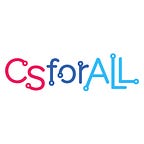CS4CT Summit 2018 — A Summary
The Connecticut Computer Science Teachers Association (CTCSTA) recently hosted the CS4CT Summit 2018, the first statewide summit in CT bringing together educators from across the state to advance K-12 Computer Science Education. The theme of the summit was “Launching the Computer Science Revolution in CT.” Over 240 attendees from over 80 school districts across the state participated.
The CS4CT Summit 2018 represented decades of advocacy work to expand and enhance computer science education in Connecticut. It also marked the initiation of CS programs in many schools. For those of us who had met together for many years in our local CTCSTA chapter meetings, often discussing our own definitions of CS and how we could execute change, we felt a renewal. As we looked around the room, there were familiar faces, but there were equally as many faces of whom we had never met. There was cheering, excitement, and high energy throughout the day in rooms filled with a range of educators, industry leaders, and representatives from the CT State Department of Education. This group had never come together before. It was a powerful day.
With funding support and guidance from ECEP, our initial key outcomes were to showcase K-12 CS curriculum options, share strategies for engaging females and underrepresented minorities in CS coursework, and highlight important activities and initiatives underway at the CT State Department of Education. We achieved these, but also realized a new sense of community and dedication that we did not anticipate. The event was not a conclusion of our hard work, but instead opened the door for a more balanced and equitable approach to spreading CS education throughout our grade levels, schools, and state. The summit laid the foundation for future work, and for that, we feel very grateful.
Support from local and national level leaders kicked off our morning. Dr. Gary S. Mala, Executive Director of EASTCONN, spoke to our students’ futures, and how strong CS pathways are essential to their education. Our panel discussion on “Reaching All Students with Computer Science,” included Jake Baskin (CSTA), Leigh Ann DeLyser (CSforAll), Ralph Morelli (Mobile CSP), and Brenda Wilkerson (AnitaB.org). The candidness and true words spoken by each of these individuals resonated with each attendee, and many felt validated in the teaching they had done in years past. There was also a sense of honesty among the panel, and it was made clear that teaching CS is a large undertaking, but with the right decision-makers and support of our peers, we can achieve it.
This panel was immediately followed by the industry perspective: “Keeping Connecticut Competitive in the 21st Century.” Local business leaders Scott Burghoff, Bruce Carlson, Nancy Davis, Jim Mersfelder, and State Board of Education member, Estela Lopez, joined together to discuss their views, focusing on the importance of filling jobs and retaining companies to stay in CT. Their viewpoints were inspiring and reaffirmed the importance of equipping our students with essential skills.
The Connecticut State Department of Education also presented in support of CTCSTA’s CS effort. In CT, we work in “silos,” as described by Jennifer Michalek (CSDE Mathematics Consultant and overseer of CS at the state level), meaning that schools develop programs based on the needs of their students, and these best practices are not often shared from town to town. CT policies allow for autonomy in our school districts, which is appreciated and respected by many, but can also create division and separation. CS education in CT can progress more equitably with state support, and she shared with the group the work that the CS Advisory Group has completed over the last four years and current initiatives surrounding K-12 CS standards and teacher certification.
The remainder of the day allowed time for focused breakout sessions and exploration of hands-on resources. A common theme throughout these sessions was equity, flexibility, and customization. Sessions offered options for all grade levels and experience levels. Some dove deep while others discussed curricula choices, professional development opportunities, or successful teaching approaches. CS is not one size fits all and the day’s activities reflected that. Teacher evaluations were also very positive, with many attendees commenting that they have new resources to bring back to their schools, that they have already scheduled meetings with administrators, and that they feel motivated to continue this work.
We are reinvigorated and excited to keep the momentum going. The summit was a jumping off point, setting the stage for what we hope will be a commitment to teach CS across all CT schools in the near future. We are just beginning!
Heather Sutkowski has been a teacher for 13 years and currently teaches K-6 Computer Science at the CREC Montessori Magnet School in Hartford, CT. She has a MA degree in Computing in Education from Teachers College, Columbia University, as well as, a BA in Modern Languages, and a BS in Elementary Education from the University of Hartford. Heather is an active member in the CTCSTA, a Code.org CS Fundamentals Facilitator, and is also part of the State of Connecticut Computer Science Advisory Group.
